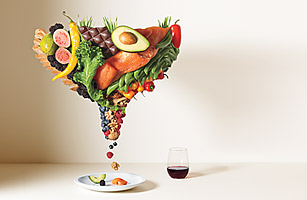
Restricting calories extends animal life, so doctors want to know if going hungry would help us too.
John Apollos is losing weight the old-fashioned way — by eating less. A whole lot less. As a volunteer in the two-year Comprehensive Assessment of Long-Term Effects of Reducing Intake of Energy (CALERIE) study at Tufts University in Boston, Apollos has lowered his daily caloric intake 25% over the past eight months. The fat, not surprisingly, has melted away; the 52-year-old physical trainer has lost more than 25 lb. (11 kg) since the study began and is down to his high school weight.
But that's not the real reason Apollos and the other participants in the program are eating only three-quarters of what they used to. The researchers running the multicenter CALERIE study are trying to determine whether restricting food intake can slow the aging process and extend our life span. "I feel better and lighter and healthier," says Apollos. "But if it could help you live longer, that would be pretty amazing."
The idea is counterintuitive: If we eat to live, how can starving ourselves add years to our lives? Yet decades of calorie-restriction studies involving organisms ranging from microscopic yeast to rats have shown just that, extending the life spans of the semistarved as much as 50%. Last July a long-term study led by researchers at the University of Wisconsin nudged the implications of this a bit closer to our species, finding that calorie restriction seemed to extend the lives of humanlike rhesus monkeys as well. The hungry primates fell victim to diabetes, heart and brain disease and cancer much less frequently than their well-fed counterparts did.
But there may be more than just the absence of disease operating here. Anytime you go on a diet, after all, you stand a good chance of lowering your blood pressure, cholesterol level and risk of diabetes and other health woes. All that can translate into extra years. With calorie restriction — usually defined as a diet with 25% to 30% fewer calories than normal but still containing essential nutrients — something else appears to be at work to extend longevity.
Finding out what that something is — and determining if it works in people — is what CALERIE is all about. By putting people on a carefully reduced diet for two years, investigators hope to home in on the biological mechanism that links eating less to living longer. They will also explore whether such a strict diet is even feasible in the overweight U.S. "We want to see if the same metabolic adaptations occurring in calorie-restricted rats and monkeys occur in humans," says Dr. Luigi Fontana, a researcher at Washington University in St. Louis, Mo., who is helping lead the CALERIE study. "But we also want to know if people will really stick with this."
Scientists have suspected that calorie restriction could extend the life span of animals since at least 1935, when researchers at Cornell University noticed that severely food-restricted lab rats lived twice as long as normal ones and were healthier. Other investigators began exploring the idea and learned that the secret is not merely a matter of body weight: lab mice that ate normally but became skinny by exercising a lot showed no longevity improvements. Only the ones that didn't get many calories to begin with benefited.
One theory is that a state of slight hunger acts as a mild but constant stressor that makes an organism stronger and more resistant to the ills of aging. (The effect could be an evolutionary adaptation, increasing the odds that animals would survive periods of scarcity.) Taking in fewer calories also slows metabolism, and some data indicate that humans with a slower metabolism live longer. But even if these theories are correct, simply defining the mechanism is not the same as identifying the molecular pathways behind it. If researchers could determine those pathways, they might be able to pharmacologically mimic the effect of calorie restriction. That could be the ultimate benefit of the CALERIE study. "Calorie restriction is pretty much the only thing out there that we know will not just prevent disease but also extend maximal life span," says Dr. Marc Hellerstein, a nutritionist at the University of California, Berkeley, who studies the biological effects of fasting.